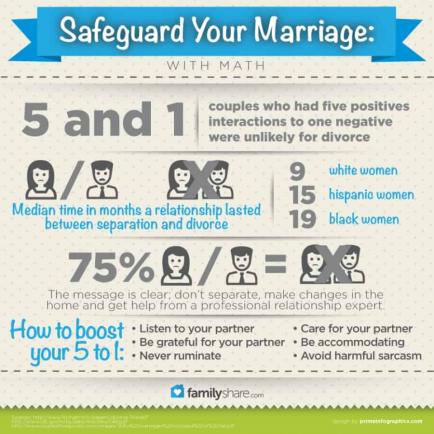
John Gottman began research on relationships at the University of Washington in 1986. Since that time, the research facility has been dubbed the "Love Lab". Hundreds of couples and research studies have passed through there. Some significant research that came from all this labor was a mathematical model that helps to predict whether marriages will succeed or fail. Gottman found that certain behaviors between couples scored higher in the negative impact they had on the marriage while forms of affection scored somewhere in the positive spectrum. For those of us who get bored just hearing the mention of mathematics, don't worry. There are only two numbers you need, five and one. Gottman found that couples who had five positive interactions to every one negative were unlikely to divorce.
A National Health Statistics reported an interesting statistic for married partners. The median time a relationship lasted between separation and divorce is nine months for white women, fifteen months for Hispanic women, and approximately nineteen months for black women. For men, the time was comparatively shorter (white- 7months, Hispanic - 11months, black men - no data). Researchers have found that seventy-five percent of couples who separate eventually transition to divorce. The message is clear; don't separate, make changes in the home and get help from a professional relationship expert. The alternative is not only costly financially because two incomes will be required to live, but the couple and their families suffer greatly, as well.
John Gottman has offered couples some self-help suggestions for those looking to boost their five to one positive interaction numbers. Listen attentively to your partner. Listening is an essential human skill that takes practice to learn. Do not just listen to respond, but listen to understand and validate what is being said. Care for your partner. This happens in innumerable ways, but you know best what makes your loved one happy. Think of the popular adage "no one cares how much you know, unless they know how much you care."� Gottman suggests that you can care by doing the small things, For example, opening the door for her or taking him to do a fun activity. Be grateful to your partner; thank them for the things they do that make life easier and more enjoyable. Be accommodating. When you disagree about a topic, show that you still value their beliefs and them as a person (this goes along with listening).
When discussing a difficult topic it's important that you do so with affection and positive emotions. When speaking, remove blaming and criticism from the discussion. Say what you mean and avoid going off on irrelevant topics. Never ruminate on past events because they almost always create defensiveness. Although humor can lighten the seriousness of a conversation and add to the positive nature of topic, be extremely wary of sarcasm, especially sarcasm that is intended to hurt. All of these suggestions can help increase positive interactions during discussions with your partner. Refer to John Gottman's book, Why Marriages Succeed or Fail, for additional self-help information for relationships. Consult a professional if there is significant distress in the relationship. A professional can counsel in regard to your specific concerns.
Source:
-
http://www.fincham.info/papers/divorce-fine.pdf
-
http://www.cdc.gov/nchs/data/nhsr/nhsr049.pdf
-
http://www.couplestherapydoc.com/images/Why%20marriages%20succeed%20or%20fail.pdf

